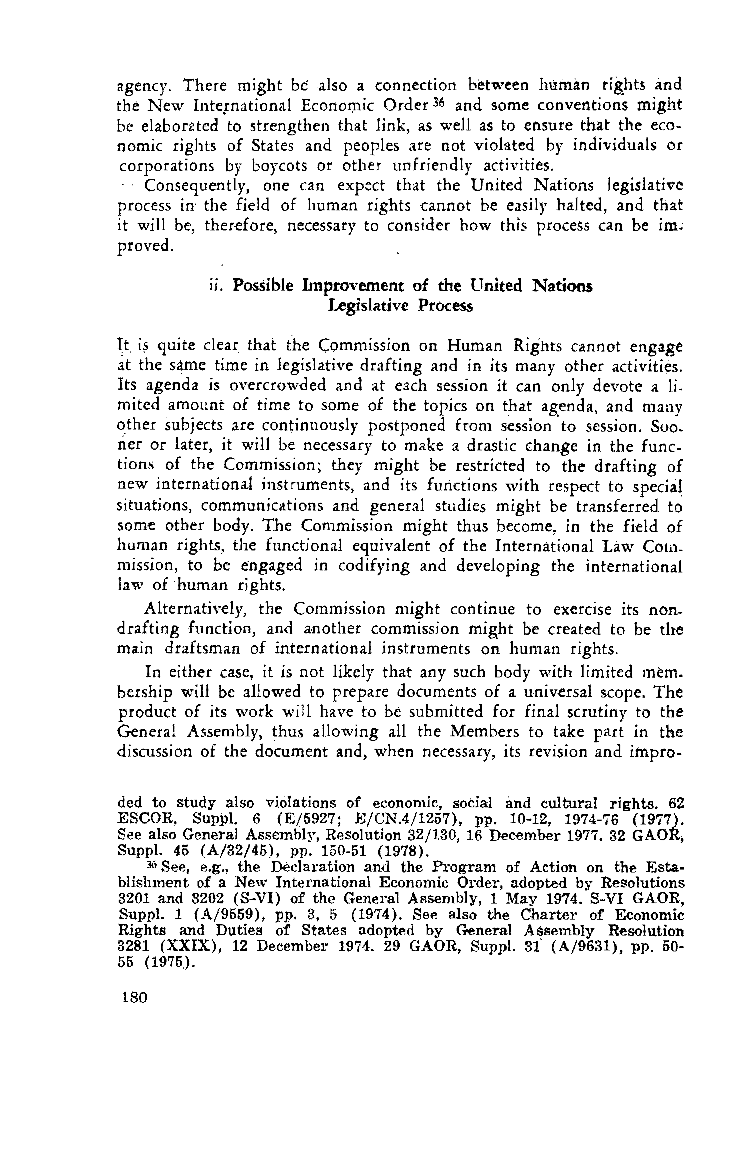
agency. There might béalso a tonnection. between hútním riahts ánd
tbe New Inte!national EconorpÍc Order
S6
and some conventions might
be elaborated to strengthen that link, as well as to ensure that the eco–
nomic rights of States arrd reoples are not violated by individuals or
corporatiorrs by boycots or other unfriendly activities.
Corrsequently, one can
exp~ct
that the United Nations legislative
process in the field of bumanrights cannot be easily halted, and that
it will be, therefore, necessary to éonsider how this process can be
im~
proved.
ll.
Possible Improvement of the United Nadon¡
Legislative Process
It
is quite dear that theCommission on Human Rights cannot engage
at the same time in legislative d!<tfting and in its many other activitiés.
Its agenda is overcrowded and at each session it can only devote a
li.
mited amount of time to some of the topies on that agenda, and many
other subjects are continuously postponed from session to session. Soo.
ner or later, it will be necessary to make a drastlc change in the func–
tions of the Commission; they might be restricted to the drafting of
new international instruments, and its functions with respect to spedal
situations, communications and general studies migbt be transferred to
some other body. The Commission might thus become, in the field of
human rights, the functional equivalent of the International Law COln.
mission, to be engaged in codífyíng and developing the international
Jaw ofhuman rights.
Alternative1y, the Commission might continue to exercise
its
non.
drafting function, and another commission might be created to be
tIte
main draftsman of international instruments on human rights.
In either case, it is not Iikely that any such body with limited memo
bershíp will be allowed to prepare documents of a universal scope. The
product of its work will have to be submitted for final scrutiny to the
General Assembly, thus allowing aH the Members to take part in the
discussion of the document and, when necessary, its revision and impro.
ded to study also viólations of economic, soCial and cultural rights. 62
ESCOR, SuppL 6
(E/5927;
E/CN.4/1257), pp. 10-12, 1974-76 (1977).
Sea also General Assembly, Resolution 32/130, 16 December 1977. 32 GAOR;
Suppl. 45 (A/32/45), pp. 150·51 (1978).
36
See, e.g., the Déclaratíon and the P1'ogram of Actíon on the Esta–
blíslllnent of a New International Economíc Order, adopted by Resolutions
3201 and 3202 (S-VI) of the General Assembly, 1 May 1974. S-VI GAOR,
Suppl. 1 (A/9559), pp. 3, 5 (1974). See also the Charter oí Eeonomic
Rights and Duties oí States adopted by General Assembly Resolution
3281 (XXIX), 12 December 1974. 29 GAOR, Suppl. 31
(A/9631),
pp. 50-
55 (1975).
180


